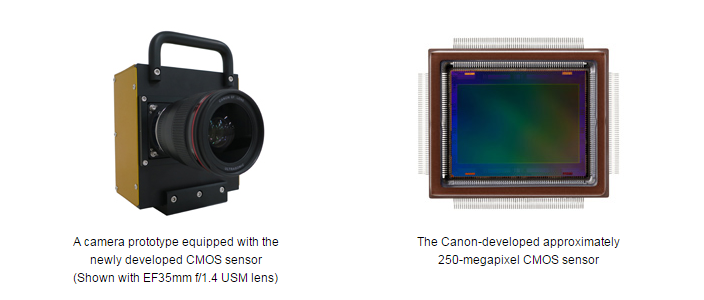Although the consumer smartphone market may have largely moved on from the Megapixel race when it comes to improving camera image quality, there are some benefits to be found from maximising the number of pixels sucked in by a camera lens. Take the new prototype CMOS sensor that Canon has created, which it claims with a sensitivity of 250 megapixels, is capable of reading lettering on the tail of a plane over 11 miles away.
Of course that wouldn't be viewable in any normally sized image, but with an image that is more than 30 times more detailed than 4k (3,840 x 2,160 pixels) you can zoom in a long way without sacrificing image quality.
This isn't even a sensor that's enormous or unwieldy, Canon has already fitted it to a commercial sized DSLR body and in-fact it's been the miniaturisation of technology that has made this sensor possible.
All in all, we're told that the sensor can record as many as 1.25 billion pixels of visual data per second and can even capture it in video. Admittedly the frame rate is restricted to just five per second, but that's somewhat understandable when you remember that it's coming through at 125 times 1080p HD resolution.
If it were to operate at 30 frames per second, Skynews points out that it would require 1.25GB of space for every second of video recorded.
Discuss on our Facebook page, HERE.
KitGuru Says: As much as sensors like these may allow for the capturing of astonishing pictures, it opens up a new argument in personal privacy. If someone taking an image from miles away can zoom in and view your bedroom in HD detail, is there something we need to do to mitigate that?
 KitGuru KitGuru.net – Tech News | Hardware News | Hardware Reviews | IOS | Mobile | Gaming | Graphics Cards
KitGuru KitGuru.net – Tech News | Hardware News | Hardware Reviews | IOS | Mobile | Gaming | Graphics Cards




That sensor will require some insane optics to collect enough photons to make the image quality decent when pixel peeping.
The privacy issue at the end of your post is moot anyway. I can purchase a 2000mm zoom lens for a great many Dslr cameras, so your privacy is already under fire. The thing keeping tools like this out of everybody’s hands is cost. Sure I can 100% believe that a lot of people would be happy to take a cheeky peek at someone coming out of the shower, but they aren’t going to spend 10’s to 100’s of thousands of £/$/€ to do so.
2000mm lens zoom example:
https://photographylife.com/what-does-a-24-2000mm-zoom-range-actually-look-like
TL:DR the assumption that this opens up new privacy issues is a ridiculous claim. Privacy has and always will be fleeting and difficult to maintain.